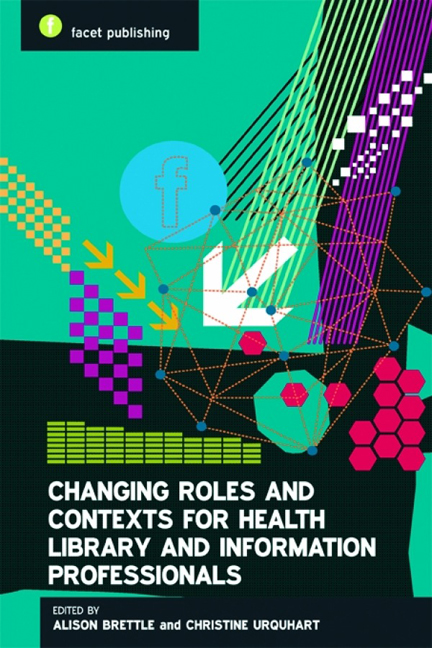Book contents
- Frontmatter
- Contents
- About the editors
- List of contributors
- Overview
- Part 1 Context
- Part 2 Roles
- 5 Skills, competencies and knowledge
- 6 The librarian as information provider and educator
- 7 The librarian who analyses information and manages knowledge
- 8 The librarian within research and evidence-based practice
- 9 The librarian as decision maker
- Conclusion
- Index
8 - The librarian within research and evidence-based practice
from Part 2 - Roles
Published online by Cambridge University Press: 08 June 2018
- Frontmatter
- Contents
- About the editors
- List of contributors
- Overview
- Part 1 Context
- Part 2 Roles
- 5 Skills, competencies and knowledge
- 6 The librarian as information provider and educator
- 7 The librarian who analyses information and manages knowledge
- 8 The librarian within research and evidence-based practice
- 9 The librarian as decision maker
- Conclusion
- Index
Summary
Introduction
This chapter discusses the librarian's role in research and evidence-based practice. Whilst Chapter 4 describes how evidence-based practice has provided health librarians with a range of opportunities to demonstrate their skills, this chapter outlines these roles in more detail with five case studies describing roles that support research and evidencebased practice, and in some cases become actively involved in those activities.
What is research?
Research is about the discovery of new knowledge or facts. It may involve investigation or enquiry, discovering causes, understanding activities or behaviours, exploring perceptions or testing hypotheses. Robson (2002) describes research that may be carried out in a ‘real life’ context, such as a workplace, which often involves some form of evaluation. Evaluation is a term familiar to most health librarians and is defined as ‘a study with a distinctive purpose, it is not a new or different research strategy but it is often used to assess the effects or effectiveness of something (an innovation or service for example) … whilst not necessarily research, evaluation profits from the principled systematic approach that characterizes research’ (Robson, 2002, 203). The skills, techniques and methods used in research, evaluation and evidence-based practice are often the same and to an extent there is some degree of overlap between the three concepts, therefore it makes sense, particularly when talking about librarians’ roles, that the three are considered together.
Supporting research and evidence-based practice
As noted and described in Chapter 6, librarians play an important role in supporting other people's research and evaluation activities. The National Institute for Health Research has produced a flowchart describing a ten-stage research process (www.rdinfo.org.uk/flowchart/Flowchart.html) that clearly states where libraries and librarians have a role to play. This includes a key role in the second stage of research – the literature review, by providing advice, training and guidance on literature searching and reviewing or conducting searches on behalf of researchers. In health service research this may well be to researchers based in academic institutions or to clinicians who conduct research within the health service.
- Type
- Chapter
- Information
- Publisher: FacetPrint publication year: 2011



